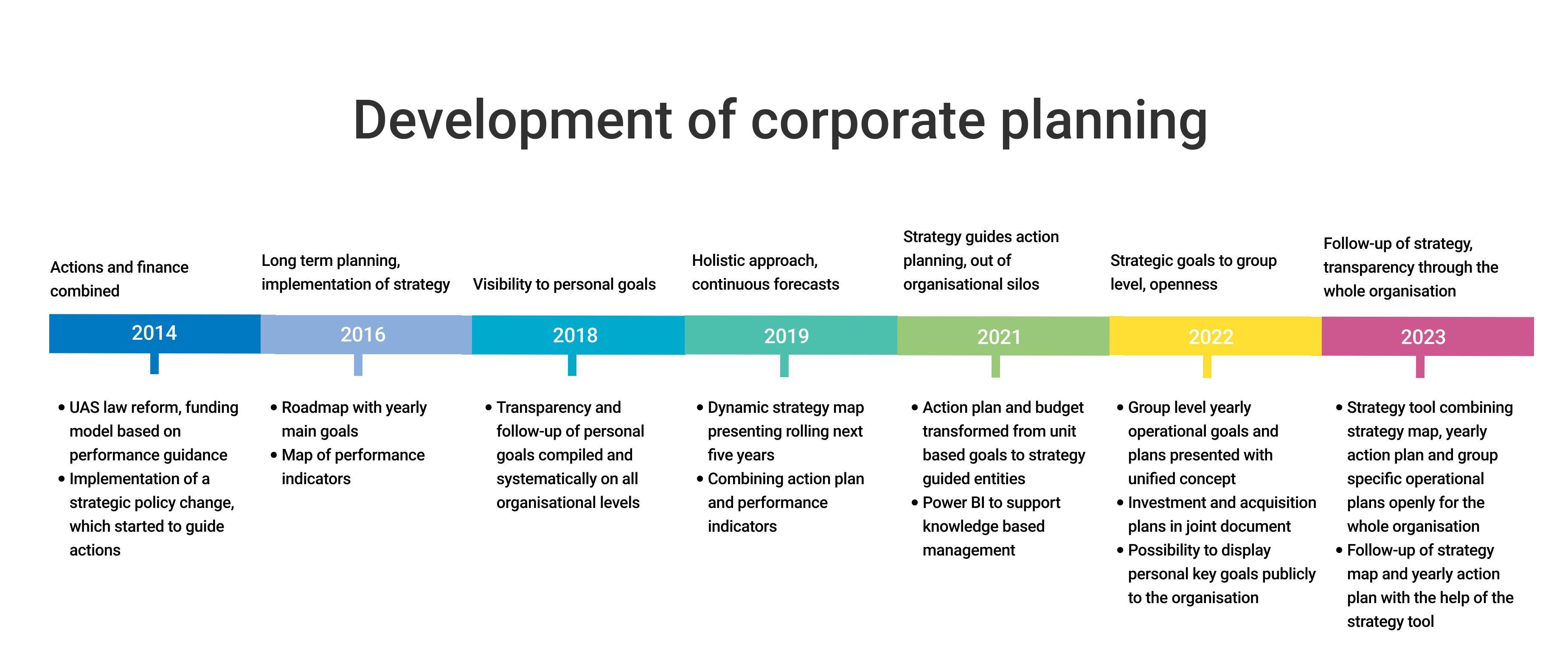Strategic and operative planning to guide actions in a holistic and open manner
Haaga-Helia has invested in developing strategic and operative planning to ensure reaching the long-term goals and fulfilling the requirements of different stakeholders. Our planning has become more holistic. We handle operational and financial planning closely together. Numerical and functional goals guide the planning of action points. We have moved from unit-specific, siloed goal setting to a more strategy-based, comprehensive style of planning. Our operational planning has become more proactive and dynamic. We have moved to a five-year rolling strategy map, which is reviewed annually. Our indicators provide more guidance, and reporting enables up-to-date monitoring and agile reactions.
Our strategic and operational planning is participatory. Both our internal and external stakeholders participate in the strategy process. Our alumni in particular were very active participants in updating the strategy in 2020. In addition to Management Group, middle management participates in creating and updating the strategy map. Staff, students, and external stakeholders take part in planning and implementing the strategic goals. In the creation of the annual action plans, we involve the entire staff at the group level and everyone personally sets their own goals based on group goals. The student union Helga plans their own actions as part of the annual planning and reviews the whole action plan in discussions with the President. The strategy documents and action plan are openly available for staff and students.
We are currently strengthening the monitoring of strategic and operational plans on different levels. The systematic update of the strategy map and the annual action plan serve as evaluation points. Our evaluation of the management and quality system produces information about the alignment of the organisation and operating models in the direction of the strategic goals. We monitor the implementation of the annual action plan more systematically, uniformly, and openly together with the staff.

Picture 26. Development of corporate planning
Evolving data management
Data management has been strongly developed alongside with strategic and operational planning to support monitoring. In the space of few years, centralised data has been made available for different roles. The corporate follow-up section is divided into financial reporting, Management Group indicators and middle management indicators. For operational activities, there is a counsellor view for the use of study guidance. We have improved our capabilities in data analytics and learned to apply artificial intelligence to the needs of students, teachers and administration. In addition, information provided by renewed feedback systems is available with content aligned with strategy. Trend data is obtained for the analysis of operations. Information is disseminated to all staff through e.g., meetings, staff infos and internal communication. More visualisations are continuously in development and, in 2022, the construction of a systematic forecasting model began.
International recognitions to degree programmes
In 2021, fulfilling our strategic goals, two of our degree programmes received quality certificates and were recognised internationally as high-quality education. The Degree programme in Hospitality, Tourism and Experience Management received THE-ICE Committed to Quality (C2Q) certificate and became the first Finnish accredited member of THE-ICE (The International Centre of Excellence in Tourism and Hospitality Education). ICCE (International Council for Coaching Excellence) awarded the Degree Programme in Sports Coaching and Management an internationally unique quality endorsement. We are the first to receive the Full Endorsement in Europe and the second in the world with an excellent 85% success rate in the evaluation. Both certificates were the result of the long-term committed work of our professional staff.
New organisation to support strategy
As the strategy period started, Haaga-Helia made the biggest organisational change since the joining of Haaga and Helia as one UAS in 2007. The new organisation established in the beginning of 2021 was built based on future strategic needs and with the aim of supporting education reform. In addition to future needs, for example, the employee surveys and discussions with middle management were used to identify the structural needs. The staff was engaged e.g., in discussion forums (informal workshops with the theme of change). The planning and implementing of the organisational change happened during COVID-19 restrictions, which we were able to overcome with virtual participatory tools. To support the change, regulations and other related documents were updated and management and cooperation forums were redesigned. The new organisation has also been evaluated systematically after implementation, and enhancement measures have been conducted to further ensure the functional structure.